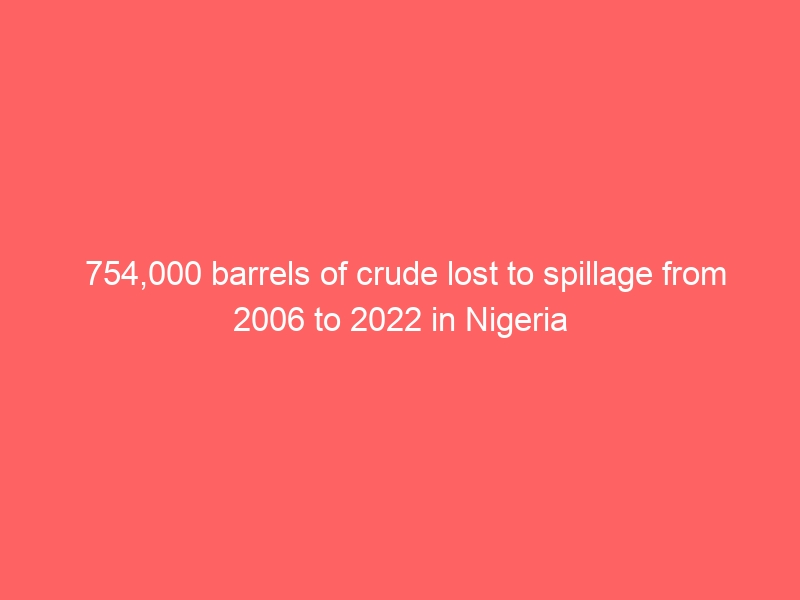754,000 barrels of crude lost to spillage from 2006 to 2022 in Nigeria
Indications have emerged that beyond the severe environmental impact of oil spill in the Niger Delta, the volume of oil spilled in the region within the last 17 years was not less than 754,196.44 barrels of oil.
Data compiled by our correspondent from the website of the National Oil Spill Detection and Response Agency indicated that the volume translates to 119,163,166.137 litres that could fill 3,769 oil tanker trucks.
The agency said these occurred in 14,053 oil spill incidents between 2006 and 2022, noting that the spillage was mainly caused by sabotage, oil theft and operational issues.
ALSO READ: Niger Delta: Timeline of oil spills in Ogoni, from 1958 to date
For example, in 2022, NOSDRA reported that 596 oil spill incidents were recorded, which led to the loss of 18,855.192 barrels of oil, which translates to 2,979,120.272 litres and 94 oil tanker trucks full of oil.
In 2021, the number of oil spill incidents was lower, at 404, in which case 22,788.378 barrels of oil which equals 3,600,563.77 litres and 114 oil tanker trucks full of oil were lost.
In 2020, the number of incidents was 433, which led to the loss of 21,049.577 barrels of oil translating to 3,325,833.193 litres and 105 oil tanker trucks.
In the preceding year, NOSDRA noted that the number of oil spill incidents was 710, during which 38,212.321 barrels of oil, equivalent to 6,037,546.682 litres that could fill 191oil tanker trucks were spilled.
In 2018, the number of oil spill incidents, 692, was lower than that of 2019. However, 25,079.682 barrels of oil, an equivalence of 3,962,589.82 litres and 125 oil tanker trucks full of oil, were lost. In 2017, the number of incidents was 600, which led to the loss of 35,041.175 barrels of oil, an equivalence of 5,536,505.719 litres and 175 oil tanker trucks.
In 2016, NOSDRA noted that there were 684 incidents of oil spill recorded, which led to the loss of 42,734.529 barrels of oil, an equivalence of 6,752,055.529 litres and 214 oil tanker trucks.
In 2015, NOSDRA recorded 920 publicly available oil spill records, which led to the loss of 47,701.628 barrels of oil, an equivalence of 7,536,857.28 litres and 239 oil tanker trucks of oil.
According to the information on the website, the highest incidence of oil spill within the 17 years was recorded in 2014, with 1,521 incidents, which led to the loss of a whopping 78,890.461 barrels of oil, an equivalence of 12,464,692.775 litres and 394 oil tanker trucks.
The second highest during the period under review was 2013, when NOSDRA noted that 1,167 incidents were recorded, leading to the loss of 32,295,157 barrels of oil, an equivalence of 5,102,634.842 litres and 161 oil tanker trucks.
In 2012, NOSDRA recorded its third highest incidence, 1,135, which led to the loss of 41,802.003 barrels of oil that translates to 6,604,716.417 litres and 209 oil tanker trucks.
Also, 2011 recorded the fourth highest, with 1,058 incidents, which led to the loss of 73,131.011 barrels of oil, an equivalence of 11,554,669.706 litres and 366 oil tanker trucks.
In 2010, NOSDRA reported that 889 oil incidents were recorded, which led to the loss of 47,261.017 barrels of oil which, an equivalence of 7,467,240.607 litres and 236 oil tankers. In the preceding year, 857 incidents were recorded, leading to the loss of 36,988.093 barrels of oil, an equivalence of 5,844,118.741 litres and 184 oil tankers.
In 2008, NOSDRA noted that 997 oil spill incidents were recorded, leading to the loss of 96,847.347 barrels of oil, an equivalence of 15,301,880.766 litres and 484 oil tankers. Also, in 2007, 1,012 incidents were recorded, leading to the loss of 70,795.77 barrels of oil, equivalent to 11,185,731.628 litres and 354 tankers.
In 2006, NOSDRA noted that there were 378 publicly available oil spill records, which led to the loss of 24,723 barrels of oil, equivalent to 3,906,378.39 litres and 124 oil tankers.
Speaking on the menace of oil spill, a major environmental and economic challenge in the Niger Delta, a professor of Chemistry in the Faculty of Physical Sciences, Nnamdi Azikiwe University, Nduka John, stated that oil spillage was often caused by human error as well as other factors.
He stated in an interview with our correspondent, “Oil spillage has many causes, including human error. In the process of loading and offloading tankers, there can be a mistake that can lead to oil spillage. Another cause is corrosion of the pipeline which can cause pipeline burst, leading to oil spillage.”
He noted further that pipelines were not adequately checked and replaced, adding, “By law, a pipeline in the water has about 15 years lifespan while that on land has about 20 years lifespan. That means a pipeline in water should be replaced before 15 years while the one on land should be replaced before 20 years, but the oil companies do not replace the pipelines because they don’t want to spend money awarding contracts for that.
“Some of these pipelines are more than 40 years old and when the pipelines spoil, they would say it is vandalisation.”
Speaking on how to curb the menace, John said oil companies should carry out proper maintenance as stipulated by law.
He added, “They should also employ professionals in the sector. According to the law, there is a certain number of staff that should come from the community, but that is for junior staff. When it comes to senior staff, they have to prioritise employing professionals that will manage the job. They need to consider the kind of staff that handles the oil company contracts.”
Shortly after his appointment, the Chief of Army Staff, Major General Taoreed Lagbaja, promised to put an end to oil theft and pipeline vandalism in the region.
While addressing media executives on July 5, Lagbaja stated, “The army will focus on the situation in the Niger Delta region, just as it will not also lose focus on what is happening in other parts of the country in line with the mandate of the current government.”
“Riding on the ‘Renewed Hope’ agenda of the President, the Nigerian Army under my watch will stamp out oil theft and pipeline vandalism in the Niger Delta.”












